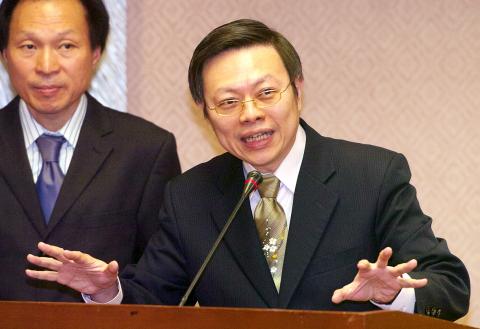|
China turning to culture to push
‘unity,’ DPP says
By Chris Wang / Staff reporter

Mainland Affairs Council Minister
Wang Yu-chi answers questions during a meeting of the legislature’s Internal
Administration Committee in Taipei yesterday.
Photo: Wang Min-wei, Taipei Times
China’s cultural “united front “tactics,
its persistent and gradual “brainwashing” of Taiwanese and the government’s
indifference to the issue could eventually wipe out Taiwan’s unique culture,
Democratic Progressive Party (DPP) lawmakers said yesterday.
The hosting of a Chinese music awards ceremony, the widespread use of Chinese
terminology in Taiwan and the increasing number of cultural projects in the name
of cross-strait collaboration could all be part of China’s efforts to absorb
Taiwan, DPP lawmakers said at a meeting of the legislature’s Internal
Administration Committee.
They cited the increasing use of the word neidi (內地, “inland”) by entertainers
when referring to China and more television stations airing China-produced
dramas during prime time as examples.
Chen Ming-wen (陳明文) described the moves as an “invisible annexation and cultural
bullying” and warned that it could create a false perception that Taiwan and
China belong to the same country.
Mainland Affairs Council Minister Wang Yu-chi (王郁琦) agreed that the use of the
word neidi was inappropriate and pledged to call on entertainers to stop using
it publicly. He promised that the council would issue an official statement on
the issue.
The lawmakers also questioned the production of Ripples of Desire (花漾), a joint
Taiwanese and Chinese production, with the government’s National Development
Fund (NDF) and TC-1 Culture Fund, of which show business mogul Wang Wei-chung
(王偉忠) serves as a board member, investing NT$35 million (US$1.2 million) each.
Deputy Minister of Culture George Hsu (許秋煌) said Beijing investors paid a
copyright fee of NT$41.9 million for the distribution rights in China and
promised a 2 percent bonus if box office receipts exceeded NT$256 million.
DPP Legislator Tuan Yi-kang (段宜康) said the Ministry of Culture had failed to pay
attention to the unfair deal and the film was listed as a Chinese film despite
Taiwan being the major investor.
Tuan also questioned the role of Wang, who has been criticized for playing
multiple roles as a recipient of NDF funding and negotiator of several
cross-strait cultural projects. He said many more people like Wang were reaping
benefits from the government’s so-called “cross-strait cultural creative
exchanges.”
Tuan said that Wang and people such as the family of New Party Chairman Yok
Mu-ming (郁慕明), who were granted the exclusive rights to sell Taiwan Tobacco and
Liquor Corp’s cigarette products in China, would not be in the position to make
money if they were not designated by Beijing.
The ministry’s failure to promote Taiwanese culture in cross-strait exchanges
will push Taiwan’s unique and diverse culture to the brink of extinction, DPP
Legislator Chen Chi-mai (陳其邁) said.
More than half of the films receiving NDF fundings were produced with themes
related to Chinese history or culture, not Taiwanese, Chen said.
DPP Legislator Pasuya Yao (姚文智) blasted the council for not responding
immediately to Beijing’s oppression of the Southern Weekly newspaper, which was
forced to change its New Year article calling for constitutional rights
protection.
Wang said the council had always urged Beijing to respect freedom of speech.
Additional reporting by Shelley Shan
|
![]()
![]()
![]()